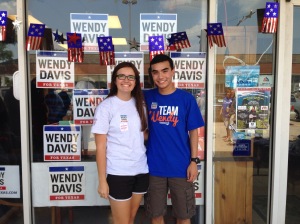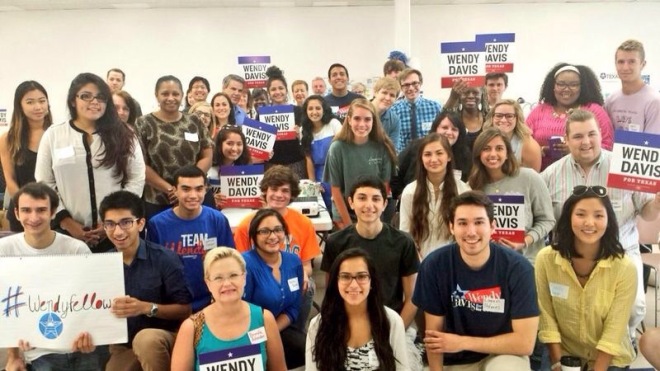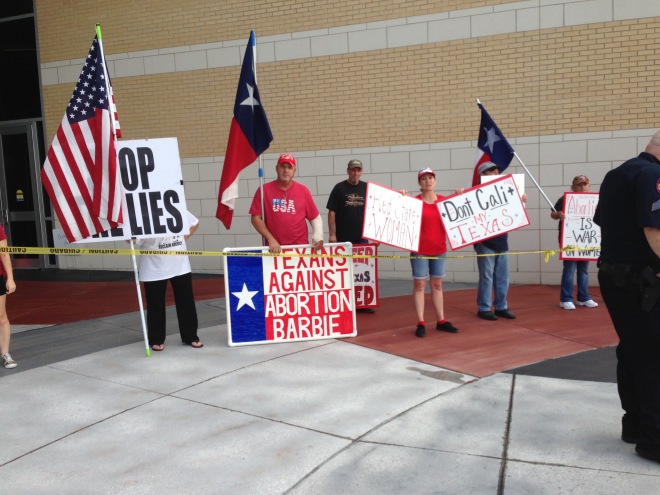This is the third and final part of my series on the 2014 Texas gubernatorial race. The first part, written in the spring of 2014, introduced the two Democratic candidates for governor and lieutenant governor. The second part detailed the candidate rally I attended in the summer of 2014.
It’s been almost one full year since the 2014 midterm elections, one year since Democrat Wendy Davis lost her race for governor of Texas, and one year since I took my first swing at politics. If you would’ve asked me in the spring of 2014 whether or not I’d work for a campaign, I would’ve told you, “Of course not. Why would I do that?”
But I went ahead and did just that. After stumbling upon a rally celebrating the anniversary of Wendy Davis’ landmark filibuster in support of Texans’ reproductive rights, I found myself on a list of potential volunteers for her campaign and received calls while I was a summer debate camp at UT Austin from Battleground Texas, the field arm of the Wendy Davis campaign, trying to get me to volunteer. While it’s not shocking for a political campaign to attempt to tap into enthusiastic supporters, what is shocking is that I said yes… and brought Alessia, one of my best friends, along for the ride.
As soon as I came home from debate camp, I called back the field organizer for my county and Alessia and I found ourselves in our county’s Democratic Party office for an introductory meeting. It was the first of many, and over the next month we learned about phone banking (calling people the campaign identified as possible Democratic voters), block walking (knocking on doors to convince people to vote), “cutting turf” (preparing packets of houses for volunteers to visit), and other essential data-driven campaign tactics. On top of those meetings, I went to two region-wide summits—one open to volunteers and another only open to fellows on the campaign—all by myself, learning so much more about how campaigning works. And then there were the events: the small rally outside the office when Wendy Davis dropped by, the book signing for her memoir at a local bookstore, and the debate watch parties.
As summer turned into fall, I quickly rose in the ranks, moving from a regular volunteer to a senior fellow, the youngest one in my area. Campaign work became something I did alongside my schoolwork, and it created (rather, cemented) a perception of me within my school as a liberal activist, since I was definitely the most vocal and visible Wendy Davis supporter in my entire school. Looking back, even though being a senior fellow on the campaign was oddly (and sometimes unnecessarily) stressful and not sleek and sexy like I imagined it, I’m so incredibly glad I took the opportunity because I learned so much in those few months on the campaign. And while these five things aren’t all I took from my experience, these are the five I’d like to share with you today!
Trying your hardest doesn’t mean you’ll succeed. But that doesn’t mean it’s okay to give up.
One of the very unfortunate consequences of my campaigning was having to learn that the amount of effort you put into something doesn’t automatically mean you’ll be successful. Much of the time, there are things that are just simply out of your control. Over the couple months I worked on the campaign, I knocked on almost two-hundred doors and made close to eight-hundred calls (Thank God for unlimited calling!). The team I worked on was one of the most productive teams in the entire state. But on November 4, 2014, Wendy Davis lost the election by 20 points. And in the county I live in, she got less than 33% of the vote. As a team, we worked our hardest to try to make ground in our county. But there’s absolutely nothing we could’ve done to sell a liberal, pro-choice candidate to the fiercely conservative Dallas suburbs.
Despite that, the proper response wasn’t to just sit down and do nothing. All of us working on that campaign very strongly believed that Texas needed change. Some of the people I worked with were high school seniors (now first-year college students), so fighting to elect a candidate who’d restore the $5 billion of cuts to our public education system was one of their top priorities. For me, it was fighting for a candidate who’d expand Medicaid after seeing firsthand how important it is to be insured when unexpected and expensive medical problems arise. I’m always proud of the fact that we all chose to go out and try to make change, even against the toughest odds. I’m always proud of the perseverance we showed throughout that entire campaign, even as poll numbers flagged and it began to feel like our efforts were useless. At the end of the day, choosing to persevere was simply an incredibly important “way of doing.”
Perseverance is failing 19 times and succeeding the 20th.
Julie Andrews
You have to ignore rude people.
While there was a large amount of pushback among students in my own school for my political views and activity, what surprised me was the sheer amount of adults incapable of being respectful and decent people while I was campaigning. Some people gave incredibly nasty responses on the phone and some doors were slammed in my face, as expected. But what was really shocking was the protestors outside of one of our campaign events, an event when all of the Democratic candidates running across the entire ticket—from governor to justice of the peace—got to introduce themselves to voters at a local community college. They screamed horrible, vile things at the men, women, and children entering the building, and as a security precaution, some of the higher-profile candidates had to exit through the back of the building because of these protestors. While they have every right to protest a small-scale political rally, it’s incredibly poor taste. (Do they honestly have nothing better to do on a Saturday night than stand outside a community college yelling at people—mostly senior citizens and high school volunteers—walking in?)
I consider them a reminder of the forces of intimidation that will always be around, opposing everything I set out to do and accomplish. But the only response is to simply ignore them, because they’re not worth your time. More than anything, you have to be firm in what you believe in, regardless of how people choose to treat you for it.
The best friends are the ones who’ll brave the Texas heat with you.
In July and August, my friend Alessia and I decided to pair up and do a lot of block walking. Wandering the neighborhood streets in search for the right houses for hours at a time when it’s over a hundred degrees outside is not fun by any definition. And while the two of us like to look back at it with rose-tinted glasses and reminisce about some of the ways we made knocking on doors fun and exciting, block walking is ridiculously hard work—not just because of the sheer amount of walking and driving we had to do, but because the Texas heat defeats all. (It’s one of the many reasons I’m planning to go far out of Texas for college next year!) While we dressed for the hot weather, we didn’t think about bringing nearly enough water for our block walking to be sustainable. But we pushed through as best as we could.
Having Alessia there is probably one of my happiest memories from my entire campaign experience. I wasn’t able to drive back then, so if it wasn’t for her, I wouldn’t have been able to do any block walking at all. And more than that, without having her there to be my partner-in-crime throughout the beginning of my campaign experiences, I honestly don’t think I would’ve said yes to volunteering for this campaign. So Alessia, if you’re reading this, thank you so incredibly much! And I can’t wait to do it again in 2018! 🙂
Side note: once GOTV (Get Out The Vote) rolled around in the first few days of November, I was already a senior fellow so I was in charge of actually training volunteers to block walk. It’s quite unfortunate that all of my block walking took place in the summer heat instead of the nice November weather.
If you want to do anything in Texas, learn Spanish.
One of the weirder things I did on this campaign was bring my phone packets with me to school, scope out a room in the school library, and make calls while my friends (who were fairly apolitical at the time) did their homework. I did that for a week straight until I realized how that really just didn’t work for a multitude of reasons. The calls I was making that week were for Democrats across the state who received vote-by-mail ballots, and since a large portion of them were Spanish speakers or were very uncomfortable speaking in English, I had to make multiple attempts at speaking in Spanish. Armed with Google Translate and whatever I could remember from my immersion experience an entire year before that, I learned how to say “I work for the Wendy Davis campaign” and “I don’t speak Spanish, but I’ll have a Spanish speaker call you later” very quickly. Needless to say, it led to more than enough laughs with friends as they very quickly picked up on the fact that my normal “Hello, I’m Joshua” switched to “Hola, soy Joshua” every two or three calls.
It’s something I’ll willingly do all over again.

One of the other senior fellows bought a Hillary cut-out for the debate watch party! Couldn’t resist taking a picture with it.
There’s a reason I still keep my Wendy Davis and Battleground Texas signs up on my wall. They’re there as a reminder of how campaigning was such a worthwhile and awesome experience that I’d definitely love to do again in other election cycles. Alessia and I had talked throughout our hours of block walking about campaigning again in 2018, the next Texas gubernatorial election (it’ll also be a U.S. Senate election, which will make it a pretty big deal) because working for change is such an important thing to do. I have thought about whether or not I’d campaign again as early as next fall for Hillary Clinton when I’m in college, and after initially saying I wouldn’t be active in presidential elections, I just know I’ll be doing it all over again—maybe not knocking on doors, but definitely doing something, whether that’s making phone calls or being active on my college campus. I already know that the College Democrats will be one of the first clubs I’ll look into—partly because of the chance to do campaign work but mostly because I’m a political junkie who made a 2016 GOP nominee bracket when there were still 16 candidates (Scott Walker broke it with his early exit). Besides, there’s no better time to do campaign work than in the first election I can actually vote in!
Granted, it’ll be a different experience since I’m planning on trading the conservative, burning-hot South for the liberal, freezing Northeast, but I just know there’ll be a whole new set of memories and lessons to learn. And besides, when I’m running for president one day, it’ll be good to know what kind of work my volunteers and staff are putting in when they’re knocking on doors and making calls on my behalf! (Only joking, I have no plans to run for president in the future.)






Been there, done that Since Ca is firmly in Obamas hands, Democrat campaigh volunteers had to go to other states to campaign. My sisterand I and a few dozens more went to Reno.
Wow! I’d love to hear more stories about your experiences with that—but I guess the volunteering paid off since Nevada went to Obama both in 2008 and 2012! A lot of the times when I think of campaign work, I wish that I was older when Obama was first running; it’d be so cool to get to say I worked on his campaign!
Pingback: Goodbye, 2015: A Year in Photos | Kuya's Notebook
Pingback: Notes from Stanford: Looking back on my freshman fall quarter | Kuya's Notebook